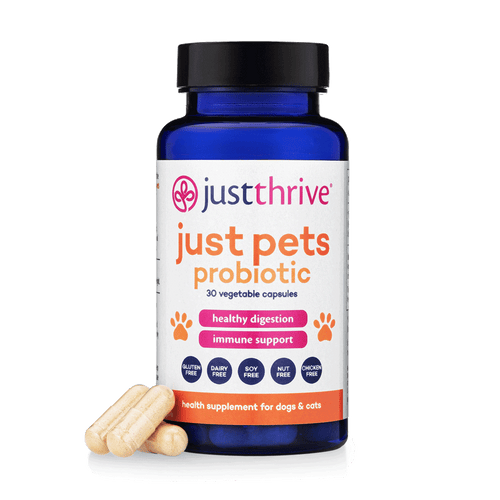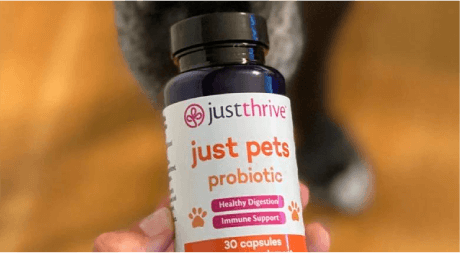From turtles to iguanas to cats to cockatiels
No matter what kind of pet you have, you love them and want them to feel good and stay healthy.
You can tell when your animal buddy isn’t feeling right. Maybe their feathers seem droopy or their coloring looks less vibrant. Maybe they’re sluggish or more sleepy than usual. Whatever it is, you know something is off.
Just like with people, your pet’s gut microbiome is the centerpiece of their health. So if you want to keep your pet safe, strong, and well, that means making sure they have a healthy gut.
Because all animals need a healthy gut microbiome to survive and thrive.
Keep reading to find out how you can help your beloved companion live their happiest and healthiest life.
More Than Cats and Dogs
Every animal has its own microbiome containing trillions of bacteria.[1] That includes cats and dogs and literally any other animal you can think of.

So you need to take care of your pet’s gut health no matter what kind of animal they are…
- Ferrets[2]
- Iguanas[3]
- Cockatiels[4]
- Koi fish[5]
- Turtles[6]
- Horses[7]
- Chickens[8]
- Piglets[9]
- Rabbits[10]
- Parrots[11]
And while all of these animals are very different, with unique diets and routines, the one thing they have in common is having a gut microbiome.
Everyone Has a Gut Microbiome
Your pet… no matter how big or small… whether it has feathers, scales, or fur… has a gut microbiome. Their gut is home to trillions of bacteria, a combination of beneficial probiotics and harmful pathogens.
In a well-balanced gut microbiome, beneficial probiotic bacteria greatly outnumber pathogens and keep those harmful bacteria under control. A healthy microbiome full of diverse probiotics contributes to your pet’s overall wellness, with special attention to their immune system.
Though it varies slightly by species, overall healthy gut microbiomes help support:
- Strong bones
- Weight management
- Lustrous coat
- Healthy skin
- Youthful energy
- Proper immune system responses
When the gut microbiome gets knocked out of balance, it causes a condition called dysbiosis.[12] That’s when pathogens begin to dominate, outnumbering beneficial probiotic bacteria and causing a wide variety of health problems. Luckily it’s easy to help your pet maintain a healthy gut.
From a majestic horse to a tiny parakeet, every pet’s gut microbiome needs probiotic support.

Common Questions – and Answers – About Pet Probiotics
An effective probiotic supplement does some amazing things for your pet’s gut microbiome:
- It helps increase levels of their own natural bacteria makeup.
- It encourages the native beneficial bacteria to flourish.
- And helps slow down any potential pathogen problems before they take over.
But trying to figure out the right kind, the right dose, and the right way to give your pet probiotics can be confusing. Here are some straight answers to help you get it right.
Can I give my human probiotics to my pet?
No. Human-oriented probiotics won’t work properly for animals. Your pet needs animal-focused strains of probiotic bacteria to keep their gut in top shape. Some of the best probiotic strains for pets include Pediococcus acidilactici, Bacillus subtilis, and Bacillus licheniformis, which are known as universal animal microbiome colonizers.[13,14]
What’s the best way to give my pet a probiotic?
The easiest way to give probiotics to your pet is to open the capsule and sprinkle it on their food. For the first week, give them one capsule every other day. After that, increase the dose to one capsule daily, preferably with your pet’s largest meal. And if your pet seems to need extra support, you can safely give them one capsule two times daily.
What if my pet needs antibiotics?
Antibiotics virtually always trigger dysbiosis in pets, disrupting their gut microbiomes and decimating probiotic bacteria populations.[15] So if your pet needs a round of antibiotics, probiotic supplements are even more important. They can take probiotics while they’re on antibiotics to help avoid a gut imbalance.
In fact, you can safely double up on probiotics during and after an antibiotic protocol for at least 2 weeks to compensate for the temporary reduction of the beneficial bacteria in your pet’s intestinal tract.
I have tried probiotics for my pet in the past, but they didn't seem to help. What should I be looking for when choosing an effective pet probiotic?
One of the most important—and overlooked—factors for an effective probiotic is survivability. Many probiotics out there, both for pets and for people, don’t arrive alive in the gut. Either they’re already dead by the time you open the bottle from things like improper storage, or they die during digestion because they can’t take the heat.
That’s where spore probiotics make all the difference. Spore probiotics have a protective outer shell that shields them from extreme heat and cold. It protects them against digestive enzymes and stomach acid. So spore probiotics arrive in the gut alive and ready to get to work. And live probiotics are the only effective probiotics.
How do I know my pet’s probiotic is working?
Pets can’t tell you how they’re feeling… but they can show you. You’ll be able to see all kinds of positive changes once the probiotics have a chance to work their wellness magic. Some signs you can look for include:
- Increased energy
- Healthy skin and coat… no matter what that coat is made of
- Better breath
- Healthier poop
- Reduced gas
- Improved digestion
- And even, more balanced behavior
Sometimes, though, your pet may experience some slight discomfort from die-off before the positive effects kick in. If you notice an increase in their symptoms, cut back on the dose and then slowly increase it back up to the full amount so your pet’s gut has time to adjust.
Just Pets Probiotics for Every Kind of Pet
Every animal has a gut microbiome, and the right probiotics can help keep their gut microbiome in healthy balance, which in turn supports their overall health.
Just Pets Probiotic contains three strains of probiotics known to support your pet’s gut microbiome:
- Bacillus subtilis HU58™,
- Bacillus licheniformis SL-307,
- and Pediococcus acidilactici NUTRI 50-51®.
Adding just one capsule to your pet’s food daily can help maintain healthy balance in the gut microbiome and support healthy immune responses. (Dosing is the same, regardless of species or your pet's size, making it super easy to administer!)
>> Give your fur… feather… scale… baby a well-balanced gut and a happy, healthy life with Just Pets Probiotic.
Still on the fence? We’re confident that you’ll notice a positive difference in your precious pet with Just Pets Probiotic when given as directed.
But if you’re not 100% happy, we’ve got your back.
At Just Thrive we offer you complete purchase protection, a 100% guarantee. If you’re not completely satisfied with your Just Thrive purchase for ANY reason, you can take advantage of our “Bottom of the Bottle” Money Back Guarantee.
Love your Just Thrive purchase, or request a full product refund at any time… Whether it’s 3 days, 3 weeks, or 3 months later… Even if the bottle is empty!
>> Try Just Pets, 100% RISK FREE, and save 30% on your first month’s subscription with code SUB30.
- de Jonge N, Carlsen B, Christensen MH, Pertoldi C, Nielsen JL. The Gut Microbiome of 54 Mammalian Species. Front Microbiol. 2022 Jun 16;13:886252.
- Scarsella E, Fay JS, Jospin G, Jarett JK, Entrolezo Z, Ganz HH. Characterization and Description of the Fecal Microbiomes of Pet Domestic Ferrets (Mustela putorius furo) Living in Homes. Animals (Basel). 2023 Oct 29;13(21):3354.
- Hong, PY., Wheeler, E., Cann, I. et al. Phylogenetic analysis of the fecal microbial community in herbivorous land and marine iguanas of the Galápagos Islands using 16S rRNA-based pyrosequencing. ISME J 5, 1461–1470 (2011).
- Alcaraz LD, Hernández AM, Peimbert M. Exploring the cockatiel (Nymphicus hollandicus) fecal microbiome, bacterial inhabitants of a worldwide pet. PeerJ. 2016 Dec 22;4:e2837.
- Zhang R, Kang X, Liu L, Wang X, Li H, Zhu J, Cao Y, Zhu H. Gut microbiota modulation by plant polyphenols in koi carp (Cyprinus carpio L.). Front Microbiol. 2022 Oct 12;13:977292.
- Rawski M, Kierończyk B, Długosz J, Świątkiewicz S, Józefiak D. Dietary Probiotics Affect Gastrointestinal Microbiota, Histological Structure and Shell Mineralization in Turtles. PLoS One. 2016 Feb 1;11(2):e0147859.
- Schoster A, Weese JS, Guardabassi L. Probiotic use in horses - what is the evidence for their clinical efficacy? J Vet Intern Med. 2014 Nov-Dec;28(6):1640-52.
- Chen P, Lv H, Du M, Liu W, Che C, Zhao J, Liu H. Bacillus subtilis HW2 enhances growth performance and alleviates gut injury via attenuation of endoplasmic reticulum stress and regulation of gut microbiota in broilers under necrotic enteritis challenge. Poult Sci. 2024 May;103(5):103661.
- Zhang M, Yang Z, Wu G, Xu F, Zhang J, Luo X, Ma Y, Pang H, Duan Y, Chen J, Cai Y, Wang L, Tan Z. Effects of Probiotic-Fermented Feed on the Growth Profile, Immune Functions, and Intestinal Microbiota of Bamei Piglets. Animals (Basel). 2024 Feb 17;14(4):647.
- Shah AA, Yuan X, Khan RU, Shao T. Effect of lactic acid bacteria-treated King grass silage on the performance traits and serum metabolites in New Zealand white rabbits (Oryctolagus cuniculus). J Anim Physiol Anim Nutr (Berl). 2018 Apr;102(2):e902-e908.
- Schmiedová L, Černá K, Li T, Těšický M, Kreisinger J, Vinkler M. Bacterial communities along parrot digestive and respiratory tracts: the effects of sample type, species and time. Int Microbiol. 2024 Feb;27(1):127-142.
- Rosenfeld CS. Gut Dysbiosis in Animals Due to Environmental Chemical Exposures. Front Cell Infect Microbiol. 2017 Sep 8;7:396.
- Melara EG, Avellaneda MC, Valdivié M, García-Hernández Y, Aroche R, Martínez Y. Probiotics: Symbiotic Relationship with the Animal Host. Animals (Basel). 2022 Mar 12;12(6):719.
- Anee, I.J., Alam, S., Begum, R.A. et al. The role of probiotics on animal health and nutrition. JoBAZ 82, 52 (2021).
- Stavroulaki EM, Suchodolski JS, Xenoulis PG. Effects of antimicrobials on the gastrointestinal microbiota of dogs and cats. Vet J. 2023 Jan;291:105929. doi: 10.1016/j.tvjl.2022.105929. Epub 2022 Nov 24. PMID: 36427604.












